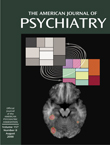Low Cortisol and Risk for PTSD in Adult Offspring of Holocaust Survivors
Abstract
OBJECTIVE: The study examined the association between cortisol and putative risk factors for posttraumatic stress disorder (PTSD) in a sample of subjects at increased risk for the development of PTSD. METHOD: Twenty-four-hour urinary cortisol excretion was measured in 35 adult offspring of Holocaust survivors and 15 healthy comparison subjects who were not offspring of Holocaust survivors. Subjects were also characterized with regard to clinical symptoms, presence or absence of psychiatric diagnoses including PTSD, and presence or absence of PTSD in their parents. RESULTS: Low cortisol levels were significantly associated with both PTSD in parents and lifetime PTSD in subjects, whereas having a current psychiatric diagnosis other than PTSD was relatively, but nonsignificantly, associated with higher cortisol levels. Offspring with both parental PTSD and lifetime PTSD had the lowest cortisol levels of all study groups. CONCLUSIONS: Parental PTSD, a putative risk factor for PTSD, appears to be associated with low cortisol levels in offspring, even in the absence of lifetime PTSD in the offspring. The findings suggest that low cortisol levels in PTSD may constitute a vulnerability marker related to parental PTSD as well as a state-related characteristic associated with acute or chronic PTSD symptoms.



